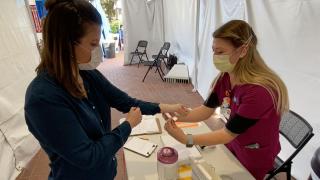It was the first few days after the "Stay at Home" order came down in California and COVID-19 was upending my work, my family and my life.
I sat at home wondering how I could give back, feel less helpless — and be more helpful.
I recalled something I read about the pandemic: "You can still go out and give blood," said Jerome Adams, M.D., the U.S surgeon general. "We're worried about potential blood shortages in the future. Social distancing does not have to mean social disengagement."
Inspired by my mom, who is a cancer survivor and devoted blood donor, I decided it was my turn to give blood for the first time. I could get out of my house. I could be engaged. And I could help.
Is Blood Donation Safe?
Since I do some work for City of Hope, I looked into the need for blood donors there. I learned that despite the altruism of many who have given blood these past several weeks, City of Hope patients are still in need of an average of 660 units of blood per week.
That's about 82 gallons — equivalent to the total amount of blood circulating in the bodies of around 63 average-sized adults.
I wanted to join those altruists, but I was scared to give blood, scared of getting COVID-19 and ignorant about the process. So I decided to find out more.
I wanted to know whether, as a healthy person, I was risking my well-being by going to a hospital setting. I needed to know what measures were in place to make sure I was protected.
I turned on my iPhone and recorded my experience to answer these questions. As it turns out, I was protected. Well-protected.
Here's what happened: watch video
Is It Safe To Give Blood?
I noticed when I first arrived at the City of Hope campus, it looked different. There was a large white tent set up near the front entrance to screen every person who will enter patient care or blood donation areas. I was asked a series of questions, had my temperature checked and was reminded to keep my mask on at all times to keep the environment as sterile as possible.
I was given a red wristband that allowed me to enter the donation center.
Blood Donor Prescreening
Once inside the donation center, I noticed the lobby chairs and donation beds had been spaced out to allow for appropriate social distancing. Hand sanitizer was provided throughout the donation process, and everything I touched was wiped down frequently.
Even the pens were sanitized.
All staff were wearing masks and gloves for their protection — and mine.
Is It True You Get Tested For Covid-19 When You Donate?
No, you will not be tested.
"Many people are asking us if their blood will be tested for COVID-19," said Kasie Uyeno, manager of Donor Recruitment at City of Hope's Blood Donor Center. "Beside your temperature and verbal screening, no testing will take place when you donate blood."
Sanitizing
What If I Have Asymptomatic Covid-19? Could My Donated Blood Infect Someone?
This is a common question.
I asked Lefan Zhuang, M.D., the medical director of the Blood Donor Center and an assistant clinical professor in the Division of Transfusion Medicine at City of Hope. She said there is no evidence that it can be transmitted through blood or blood components.
She added that there have been no reported cases of transfusion-transmitted coronavirus.
Transmissible in Blood?
How Often Can I Donate?
For whole blood donation — which involves donating blood that comes out straight through the vein and does not undergo any separation of components such as platelets — you are able to donate about every eight weeks (56 days.)
You can donate platelets (which are the components of blood that are important for clotting and whose levels can be diminished by certain types of cancer) more often — every seven days, or up to 12 times a year.
And a type of donation called power red donation, which cycles the blood through a machine that allows for more blood donation, can be done every 16 weeks, or approximately every 112 days.
Donation Success
To make an appointment to donate blood, or to find out more, please visit idonateblood4hope.org.
